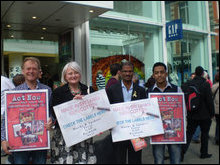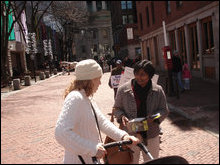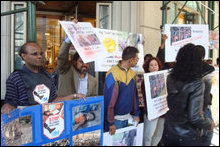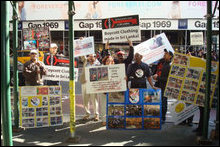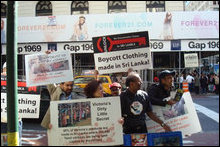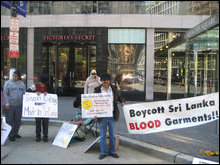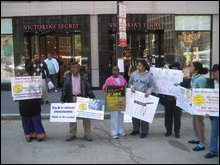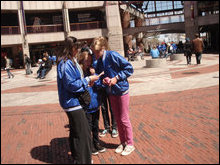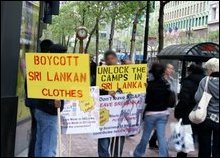While a few U.S. cities, including Washington postponed the planned Sri Lanka Boycott rallies due to the record-breaking snow storm, in most of the 15 cities Tamil activists held protests urging ethical-minded consumers to boycott Sri Lanka products, especially textiles, as the protesters allege that the profits fund State violence against Tamil civilians, organizers of the protest said. Meanwhile, the organizers of the boycott campaign released a third-video in a planned series of video releases highlighting the need to black-label Sri Lanka products across the world, sources close to the boycott campaign said. The protest ralllies across the U.S. cities Saturday were very successful in spreading the message, and the experience in the past weeks is helping the activists improve the effectiveness of the rallies, the organizers said.
TamilNet received a brief summary of the rallies held Saturday:
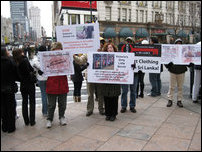
Protesters in New York
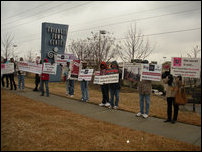
North Carolina protest
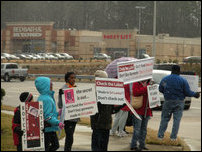
North Carolina protest
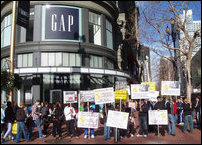
San Francisco protest
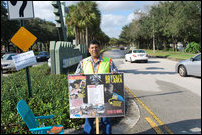
Florida protest
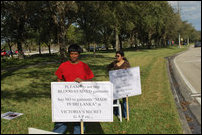
Florida protest
The small but energetic Florida group gathered for the fourth time near the Sawgrass Mills mall Saturday. Shoppers curiosity in knowing what is going on in Sri Lanka, is making the boycott meaningful for the Florida Tamils, an organizer of the protest said.
Raleigh, NC: Nearly two dozen people showed up for a "freezing boycott" at the front of a mall entrance. Later this was moved to a intersection of two main roads for better visibility and exposure. Lots of people slowed their vehicles to read. The organizers at the end of the rally dropped brochures on the cars in the parking lot.
San Francisco, CA: An enthusiastic group of over 20 activists including many woman and children at the rally. Almost every person carrying a placard in front of Gap was kept busy by shoppers approaching them to ask for more information and get better informed. The city was bustling with shoppers and tourists, and a couple from Switzerland decided to donate some money after talking to the activists about the human rights violations in Sri Lanka.
Many provided their contact information and wanted to be informed on the subject. The street musician across from Gap store was playing his drums while singing "Say No to Sri Lanka" and "No to War Crimes" helping us get attention to the protest.
Some of the protesters walked over to Victoria's Secret, engaging with shoppers along the way. Victoria's Secret called the police to try and intimidate us. Police were told that we were harassing their customers and preventing them from going into the store. Two of the three police officers who arrived at the scene were friendly faces who had seen our protests in the past. Seeing that we were a peaceful bunch, the officers talked to us about the protests while the third officer went into the store to educate them about the rights of citizens to protest. The policemen lefter after engaging in friendly conversations as they had better things to do.
A couple of activists went to meet with the store managers at Victoria's Secret and Gap. The store managers found it hard to be friendly this time around. The corporate HQ and their PR are in touch with the local management, keeping them informed as well as collecting information.
Overall we had another successful protest in San Francisco, handing out hundreds of brochures, fliers and coupons, and more importantly talking to customers and getting public support.
Los Angeles, CA: About 10 activists gathered at the South Coast Plaza mall, Coasta mesa, CA at 11:00 a.m. Two activists each stood at doors of Baby GaP, GAP, Victoria secret and Banana Republic to distribute fliers We delivered about 400 flyers.
The Banana Republic manager and GAP managers inquired if we had permission, and turned back after we said we had permission. We distributed fliers asking shoppers to boycott Sri Lanka products. The protest was peaceful.
Atlanta, GA: Nearly ten of us turned out for the protest in the freezing temperature (for Atlanta, 30 degF). We stood at the mall entrance for more than an hour. After that we all went inside the mall and had an informal discussion on followup actions, and how we could make the effort more effective.
Raleigh, NC: We in Raleigh had a freezing boycott too. We were really numb after a while. Total 17 people showed up with a few children. Originally we started in front of a mall entrance then walked to a main intersection for better visibility and exposure. Lots of people slowed their vehicles to read. Then we dropped brochures on the cars in the parking lot.
Detroit, Michigan: Boycott protest was held in the metro Detroit at Great Lakes Crossing Mall for the first time. We had about 25 participants including children from Metro Detroit as well as from Windsor Ontario. We distributed about 200 flyers. We planned it for 4:00-6:30 but had to stop at 5:30 on the direction of Mall security.
Dallas, Texas: A small team of activists protested close GAP and Victoria Secret which were right next door to each other. Plans are afoot to expand the number of protesters in the area where President Bush lives.
Chicago, Illinois: The determined group in Chicago continued with the protest despite the freezing weather. We gathered in front of Gap and Victoria Secret at Michigan ave downtown Chicago from 10:00 a.m. to 1:00 p.m. and handed out around 600 fliers.
Boston, MA: Boycott Team covered 4 locations in Boston, The weather wasn’t cooperative with the wind-chill at 14° F, but the activists continued their protests. The shopping traffic was light due to the weather, the participants observed.
New York, NY: A small number of activists stood in freezing temperatures, carrying placards urging shoppers to boycott Sri Lanka products, at 34th and broadway 12:30 to 3:30pm Saturday.
External Links:
































